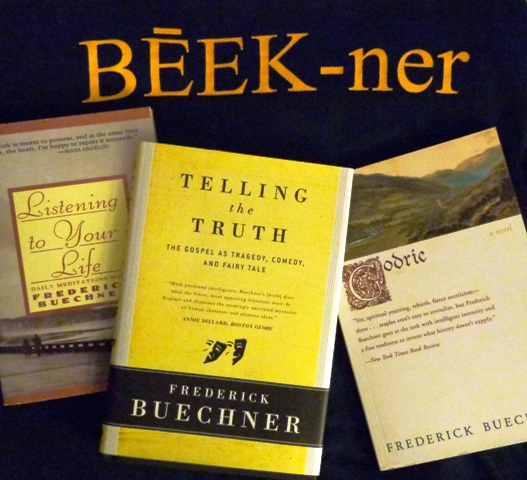“Here is the world. Beautiful and terrible things will happen. Don’t be afraid.” – Fredrick Buechner
 Through his works Carl Frederick Buechner continues to show readers the grace found all around us in everyday life and how to believe in the great invisible mystery of God when He so often seems invisible. His works range from memoirs, essays and sermons to fiction and non-fiction novels, as well as painted pictures with words that all illustrate the strength and impact of the faith he has found despite some difficult beginnings. One of the most pivotal moments in Buechner’s early youth was the suicide of his father which fueled his search for truth, home, joy, and courage.
Through his works Carl Frederick Buechner continues to show readers the grace found all around us in everyday life and how to believe in the great invisible mystery of God when He so often seems invisible. His works range from memoirs, essays and sermons to fiction and non-fiction novels, as well as painted pictures with words that all illustrate the strength and impact of the faith he has found despite some difficult beginnings. One of the most pivotal moments in Buechner’s early youth was the suicide of his father which fueled his search for truth, home, joy, and courage.
Through his collection of autobiographies which include The Sacred Journey, Now and Then, Telling Secrets, and The Eyes of the Heart, Buechner recalls significant moments and emotions and “tells his story” all while subtley imploring the reader to tell their own.
As he grew older, his family moved to a variety of places including Bermuda and North Carolina before he attended Princeton from 1944-46. World War II interrupted his education, however, and he joined the military. After the war, he returned to Princeton and graduated with a Bachelor of Arts in English in 1948.
His first book, A Long Day’s Dying, was published in 1950 and received wide acclaim. He then moved to New York City to make a living writing but found that the words of the noted Presbyterian pastor, George Buttrick, inspiried him to reconsider his calling. Not long after meeting Buttrick, Buechner enrolled in Union Theological Seminary (New York) where he graduated with a Bachelor of Divinity degree in 1958. He was ordained on June 1, 1958 and many of his early sermons were later published as collections in The Magnificent Defeat and The Hungering Dark.
He moved his family to Vermont in 1967, where he continued to write and began to add some humor to his spiritual touch. One of his best known books, The Book of Bebb, a tetralogy of the story of the phony priest Leo Bebb, contains many entertaining scenes as Bebb fights with the question of belief and unbelief, self-identity, and the nature of sin.
In 1981, his novel Godric, telling the self-realizing story of a twelfth-century holy English man, was nominated and a finalist for the Pulitzer Prize. He has also been awarded the Irene Glascock Prize for Poetry, the O. Henry Award, Rosenthal Award, Christianity and Literature Belles Lettres Prize, and Critics’ Choice Books Award for Fiction.
Award-winning or not, his works have touched the hearts and influenced many people including other authors and ministers. Pulitzer winning author Annie Dillard calls him, “One of our finest writers” and USA Today named him as, “One of our most original storytellers.”
Over the years, Frederick Buechner has continued to write in a variety of genres with publications such as Telling Secrets (1991), Speak What We Feel (Not What We Ought to Say) (2001), and Secrets in the Dark (2006). In 2008, King University founded the Buechner Institute on its campus. The Institute hosts authors, biographers, journalists, musicians, athletes, and a variety of speakers that address the concern of the relationship between faith and culture.
Buechner’s writings and sermons help us remember that faith and grace surround us in the everyday of our lives whether we see it or not. He reminds us that in the end, “What’s lost is nothing compared to what’s found, and all the death that ever was, set next to life, would scarcely fill a cup . . . “
“All moments are key moments,” writes Buechner, “and life itself is grace.”
By Jessica A. Roberts


